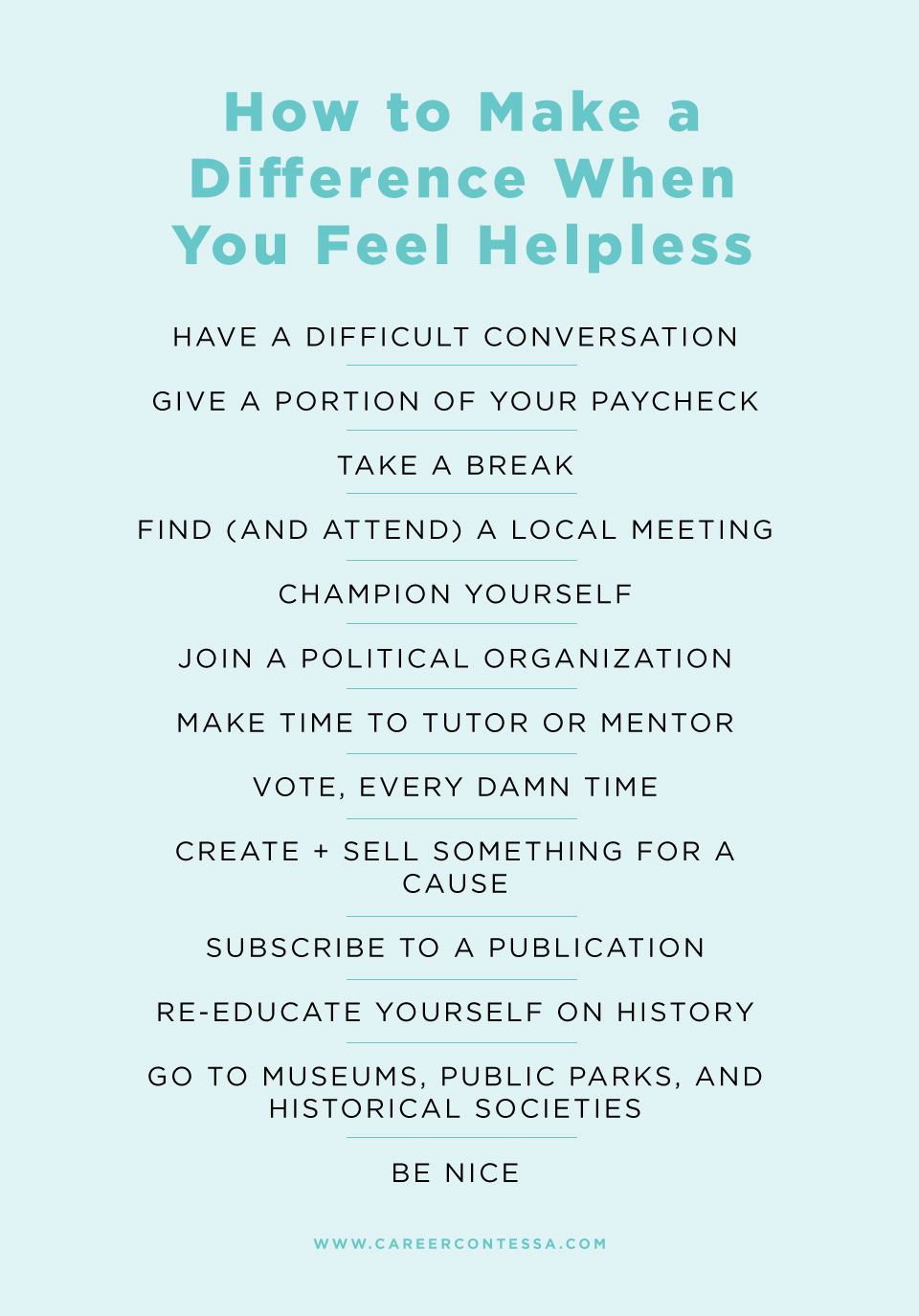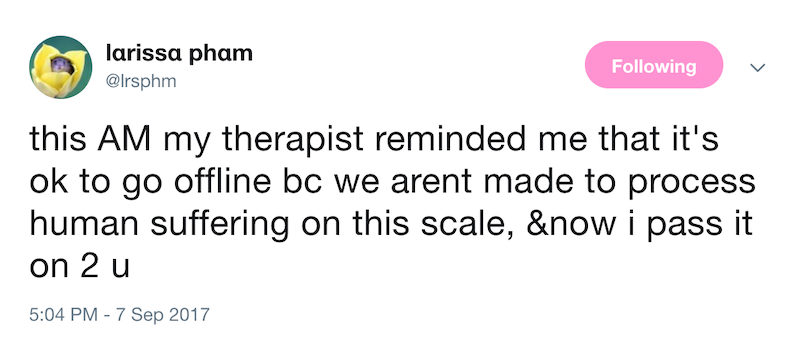Back in 2017, I wrote a
personal article on Medium.
It was a politically tough year and an emotionally trying year. I was glued to the news and to a never-ending Twitter feed—to the detriment of my every day.
The news cycle was completely ablaze with headlines about politics, racial unrest, hurricanes, flooding, fires, and shootings. That was only skimming the top of what was happening. And guess what? it's been a couple of years and we still haven't gotten any reprieve.
Here, three years later, I still find it difficult to sit still at work. Some mornings, I sit over my coffee at home reading the news—and I want to start my day by giving up and having a good cry. Alongside the fires, mudslides, politics, an overwhelming homeless population, and
rampant sexual assault. We have children being kept in camps, previously rigid laws being rewritten to the detriment of women (and children) everywhere, and an unprecedented opioid epidemic. Many of us are left thinking, "What can I
even do?" or "Is there anything
I can do?"
No matter which side of the aisle you sit on, these times are sad and scary—many of us are left feeling helpless. What can a single person do to stop a damaging bill from being passed?
By no means are we experts in changing the entire world. However, there are small things we can all do to help out. It’s taking a moment to have an uncomfortable conversation with a loved one. It’s giving a little money to an organization that you stand behind. It’s sharing words of encouragement.
Here are a few practices we have tried out in order to feel a little
less anxious and helpless—and a lot more action-based.
Have A Difficult Conversation
These 24-hour news cycles have everyone up in arms. After a long day of reading about everything happening, you might see an incoming call from "Dad." Is this your opportunity to share with him your feelings on what's going on? Do you let the call go to voicemail or do you pick up?
The bad news: families and loved ones disagree on a variety of subjects. The good news: these are some of the best people to have the toughest situations with. There is a good chance that you can have a
healthy and constructive debate with your mom, your sister, or your cousin without damaging your entire relationship.
Our challenge is this: next time your loved one shares an opinion that is tough for you to stomach, question it. Changing minds can seem like an insurmountable task, but when you see the opportunity to have an uncomfortable discussion, have it.
Give A Portion of Your Paycheck
We all know the saying, "Put your money where your mouth is," but do we actually do it?
Many organizations are facing threats—or in some cases, the harsh reality—of
de-funding from the federal government. Take a small portion of your monthly income and give to organizations that you really care about.
Even if you are on a tight budget, consider making a monthly gift of $5. Anything helps. You will never regret this expenditure. You can even set up a monthly automatic donation so that you don't need to think about it.
Take A Break
A few years ago, I came across this tweet from user
larissa pham, it reads “this AM my therapist reminded me that it’s ok to go offline bc we arent made to process human suffering on this scale & now i pass it on 2 u.” (Remember when we only had 140 characters in tweets?)
At that moment, I closed out of Twitter and Facebook. I took a break from the constant upset—and that lasted a little while. I know that many of us are sick of the "self-care" dialogue, but this falls under that umbrella. Sometimes, caring for yourself means giving yourself a break. Give yourself a second
to breathe and catch up on your own well-being. The world needs you long-term.
Find (and Attend) A Local Meeting
Things are happening all around us—every day. if you're looking to get involved in local politics or stay apprised of what's going on in your neighborhood, consider attending some local community events.
Wherever you live, there is likely a
calendar of meetings accessible—and open to—the general public. To find them, simply type "community meetings near me" into your favorite search engine. From there, you should be led to your city, town, or municipality's calendar of public hearings, neighborhood meetings, transportation meetings, and more.
Pop into one of these meetings. Get a taste of what it feels like to get involved in different aspects of the community around you. It's your right.
Champion Yourself
This may seem like a departure, but it's crucial. Something that every great leader and activist has in common is that they took a personal stand. Sometimes, the greatest thing you can do to start to make a difference is work inwards.
Typically, people who make a huge impact on the world know they aren't perfect. Rather, they look inward to constantly analyze their gaps or inborn biases. Every change you want to make will start within you. Do the work on yourself—and then go forth into the world with equal parts confidence and openness.
Join A Political Organization
If you're passionate about politics, this is a pretty opportune time to get involved. Civic engagement is a large part of making things happen. At a high level, you may join your political party's organization or canvass for a major election. Here is a list of
active political parties in The United States. Use your membership to keep yourself up-to-date and to help out where you can.
At a more local level, you may volunteer on a campaign that you feel particularly passionate about. Research your local politicians. Contact them to see where they need help. Whether it's licking envelopes or sending newsletters, help out wherever they need it (and trust us, they need the help.)
Make Time to Tutor or Mentor
Education is at the root of everything. It's my personal opinion that educating others is the best way to allow for educated decisions to be made. At this moment in time, we are living in a world polluted by clickbait.
The best way to combat the spread misinformation is by displacing it. Make time to tutor a student, to mentor someone in your industry, or to simply write about what you've learned from dedicated research. The internet is a vast resource of both reliable and unreliable information. Take the time to wade through the mess and create educational opportunities for those around you.
Vote, Every Damn Time
Create + Sell Something for A Cause
If you're looking to raise money for a particular cause, refer to your talents—and offer them out. For example, there are plenty of artists who will offer free drawings or paintings in exchange for a donation to a cause.
As a crafter, painter, wordsmith or a baker (yum, especially as a baker,) consider creating some of your best work and donating proceeds to your favorite charity or organization.
Subscribe to a Publication
If there's a specific publication whose articles are well-researched and informative, support them. Whether it's making a one-time donation or subscribing to a monthly membership, do it.
Smaller publications are up against it. They need all the support they can get to continue to produce hard-hitting journalism that doesn't revolve around post-baby bodies or celebrity feuds. Find the publications that mean the most to you—and lend them your support.
Re-Educate Yourself on History
Sometimes, you don't have to look too far to see mistakes we, as a society, have made—and grown from. When past patterns start to re-emerge, it can be especially frightening. The history we learn as we go through our education can tend to be a little whitewashed. Luckily, there are plenty of ways to learn or expand our historical knowledge—both locally and worldwide.
A good place to start is by reading
historical atlases. Historical atlases include maps and charts to give a visual representation of geopolitical landscapes. There are a variety of historical movies, autobiographies, podcasts, museums, or even historical events to help color your knowledge better than the usual textbook-based continuous narrative.
Go to Museums, Public Parks, and Historical Societies
Can you imagine a world without museums or public libraries? Let's make sure we are supporting them when we can. Go to museums, especially publicly-funded ones, often. Donate when you can. Share a beautiful Sunday afternoon with your family. Admire historical paintings, sculptures, and drawings. Soak in the past at a historical museum.
Escape from bustling city life by spending a day in your public park. By taking advantage of some of these public properties, you and your loved ones will likely become more motivated to do whatever is possible to maintain their presence in your lives—and the lives of your neighbors.
Be Nice
You know something? Everything falls aside—your political leaning, your employment status, what car your drive, your vegetarian diet, your impact on the environment—when you are a jerk to others.
- Be kind to those around you.
- Always tip your server.
- Don't yell at telemarketers.
- Treat your flight attendant nicely the next time you fly.
Kindness goes a long way. It's a busy, busy world. Don't forget that kindness is important. Teach your friends, your family, and your children to be kind. But first, lead by example. Kindness is contagious.













